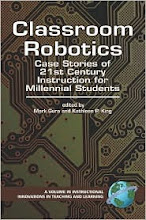Roboticists Answer Our Questions...
...7. Do you have any suggestions for younger kids, in grade school, who are interested in science and robotics?
Ashitey Trebi-Ollennu: Hard work always pays off. You need to take Math and Science very seriously and most importantly English, because there is no point in being smart if you cannot communicate your ideas. It is all about teamwork. Also you need to remember that robotics is an experimental science so you need a great deal of patience.
Ayanna Howard: Find hands-on activities that get you excited - such as robot competitions and robotic kits (e.g. Mindstorm).
Brett Kennedy: While it's never too early to start experimenting with science and robotics (LEGO Mindstorms kits are great), read and learn as much as possible about the human world. Building robots or advancing science is not sufficient in itself; it must be done in the context of humanity's needs. Therefore you need to understand as much as possible about humans as well as robots.
Edward Tunstel: If you're interested in having similar fun...I mean doing similar "work", be sure to study math and science hard. If it doesn't come to you easily find help and continue to work at it. To be a robotics engineer, it is necessary to understand high levels of math and science as well as how computers and machines work. If math and science are not fun by themselves, you can surely find enough fun and challenges to suit your needs by applying them to robots. The college and university degrees in major disciplines I mentioned above will provide a necessary background. Finally, tinkering with computers, robots, video games, etcetera is also a good use of time since you never really stop doing similar things in a career as a robotics engineer.
Mike Garrett: Yes. Think physics. Where you have a choice, look for good teachers in the humanities who can help you develop your thinking skills. They are hard to find, but usually they are the tougher teachers, and they are always the ones who give lots and lots of writing assignments. (Sorry, there just is no easier way.) I wish someone had told me this: in your math and science classes it is not the grade that matters, you need to learn everything in each class because it all fits together later. An A is not good enough if you have not learned enough, and you don't need the A if you have..."
See the full article at its source: http://robotics.nasa.gov/students/robotics.php
.....................................................................................................
Click on book cover for information on Getting Started with LEGO Robotics.

Anyone who works with kids can do LEGO Robotics, a rich and highly motivating platform for important STEM Learning! (surprisingly affordable, too) This books explains it all!
Check out ROBOTICS for TEACHERS Podcast
www.roboticsforteachers.com



No comments:
Post a Comment